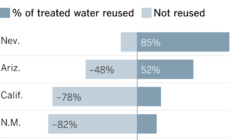-
He saw his mom killed in Mexico and longs to see his family - 11 mins ago
-
UPS Shipping Changes Planned for 2025 - 25 mins ago
-
Bangkok Building Collapse Leads to Scrutiny of Chinese Company - 31 mins ago
-
Rick Caruso says Palisades Village seeks to reopen in early 2026 - 52 mins ago
-
Crucial Weather Alert Tool Paused Over ‘Contract Lapse’ - about 1 hour ago
-
Democrats Get a Boost, and a Deportation ‘Error’ - about 1 hour ago
-
For the first time in 25 years, California has a snowpack trifecta - 2 hours ago
-
Israel Expanding Gaza Offensive, ‘Large Areas’ to Be Seized - 2 hours ago
-
Israel Announces Plans to Seize ‘Large Areas’ of Gaza as It Expands Offensive Against Hamas - 2 hours ago
-
Europe’s Plan to Ditch US Weapons Spooks Pentagon: Report - 2 hours ago
Trump Administration Tied Migrants to Gang Based Largely on Clothes or Tattoos, Papers Show
The Trump administration has granted itself the authority to summarily deport Venezuelan migrants accused of being members of a violent street gang on the basis of little more than whether they have tattoos or have worn clothing associated with the criminal organization, new court papers show.
The papers suggest that the administration has set a low bar for seeking the removal of migrants whom officials have described as belonging to the street gang, Tren de Aragua. This month, the White House ordered the deportation of more than 100 people suspected of being members of the gang under a powerful wartime statute, the Alien Enemies Act, and have denied them any due process to challenge the allegations against them.
In the court papers, submitted over the weekend, lawyers for the Venezuelan migrants produced a government document, titled “Alien Enemy Validation Guide,” that laid out a series of criteria administration officials are required to meet to designate the men as members of Tren de Aragua.
The document established a scoring system for deciding whether the migrants were in fact members of the gang, which is often referred to as TdA, asserting that eight points were required for any individual to be identified as a member.
According to the document, any migrant who admitted to being a member of the gang was assigned 10 points, meaning that they were automatically deemed to belong to the group and were subject to immediate deportation under the Alien Enemies Act.
But the document also asserts that officials can assign four points to a migrant simply for having “tattoos denoting membership/loyalty to TDA” and another four points if law enforcement agents decide that the person in question “displays insignia, logos, notations, drawings, or dress known to indicate allegiance to TDA.”
Moreover, the document says that officials can identify members of Tren de Aragua merely if they are “dressed in high-end urban street wear” — especially basketball jerseys from the Chicago Bulls or its former star player Michael Jordan.
Lawyers for the Venezuelan migrants have repeatedly claimed that officials have used the existence of tattoos to falsely accuse several people of belonging to Tren de Aragua and deporting them to a notoriously brutal prison in El Salvador.
In one instance, a man who was deported was accused of having a crown tattoo that officials said proved his membership, but his lawyers claimed that the tattoo was in honor of the man’s favorite soccer team, Real Madrid. Another migrant got a similar crown tattoo, the lawyers said, to commemorate the death of his grandmother.
The validation guide, with its eight-point scoring system, was part of a larger filing by the lawyers arguing that the Trump administration was acting unlawfully by denying the migrants any opportunity to challenge accusations that they belonged to Tren de Aragua in the first place.
The lawyers have also challenged the administration’s broader use of the Alien Enemies Act, saying that officials have misused the law, which is supposed to be invoked only during times of a declared war or during an invasion by a foreign nation.
Two weeks ago, Judge James E. Boasberg of the Federal District Court in Washington temporarily barred the White House from using the law to deport any of the Venezuelans. The Trump administration has asked the Supreme Court to freeze the judge’s order as it considers its underlying merits.
According to the court papers filed this weekend, one of the men accused of belonging to Tren de Aragua because of his tattoos was Andry Jose Hernandez Romero, a professional makeup artist who has often worked at beauty pageants and who identifies as gay.
Lawyers for Mr. Hernandez Romero said that his tattoos included one showing a crown next to the word “Mom” and another of a crown next to the word “Dad.”
“There is no evidence to believe that he is affiliated in any way with Tren de Aragua and Andry has consistently refuted those claims,” his lawyers wrote. “He fled Venezuela due to persecution for his political opinion and his sexual orientation and his tattoos have an obvious explanation that has nothing to do with a gang.”
In a separate issue related to the case, Judge Boasberg has set a hearing for this Thursday to discuss whether the Trump administration violated his initial order pausing the deportation flights by allowing two planes of Venezuelan migrants to continue on to El Salvador on March 15. For nearly two weeks now, the judge has been trying to get administration officials to give him detailed data about the flights in an effort to determine whether the White House ignored his instructions to turn the planes around.
In seeking to avoid handing over the data, the administration has asserted that details about the flights are vital state secrets that are legally protected from disclosure. By invoking that protection, the administration has sharply escalated its conflict with Judge Boasberg, which legal experts have feared could precipitate a constitutional crisis.
On Monday evening, lawyers for the Venezuelan migrants told Judge Boasberg in court papers that the White House’s invocation of the so-called state secrets privilege was “entirely unwarranted.” They asserted that they were unaware of any other case in which the government had relied on the doctrine “to withhold evidence from a court seeking to enforce its own orders.”
The lawyers also pointed out that Mr. Trump himself recently amplified a social media post by President Nayib Bukele of El Salvador that revealed information about the planes, including their tail numbers and the names of the companies that owned them.
The lawyers argued that the administration’s reliance on the state secrets privilege in this case was both wrongheaded and potentially damaging.
“If the government’s reasoning here were accepted more broadly, it could thwart judicial investigation of contempt whenever the government asserts a nexus to ‘foreign affairs’ or ‘national security,’” they wrote, “allowing the executive to defy court orders with impunity.”





















